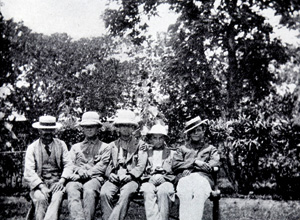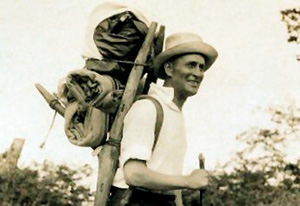A vagabond in Ceylon
“It is easy to account for the vagabond’s fondness for tropical lands. He loves to strut about among reverential black men in all the glory of a white skin; it flatters him astonishingly to have native policemen and soldiers draw up at attention.” – Harry A. Franck, A Vagabond Journey around the World (1910)

Franck, seen second from left, among a motley group who slept in Gordon Gardens
When 19th and early 20th century English narrative literature regarding Sri Lanka is under discussion, familiar names such as Percival, Cordiner, Forbes, Tennent, and Woolf are likely to be mentioned. But important though their descriptions are, these men were all military officers or civil servants, who viewed the island as a possession from the apex of the colonial system.
However during that period there was an underside to the colonial system. Ceylon was a temporary or semi-permanent home to many hundreds of vagabonds or beachcombers as they were termed, penniless travellers mainly from Britain but also Europe and America. One American, Harry A. Franck, born in 1881 in Michigan, became the leading author of the ‘educated’ (graduate and teacher) vagabond experience. The record of his first, A Vagabond Journey around the World (1910), which included his visit to Ceylon in 1905, became a best-seller and 20-odd such books followed.
His commentary is unusual in that unlike the conventional authors, here was a person lacking privilege, travelling on foot, without money – but with a camera – who never went near the resthouses and hotels so often described by ‘the others’, but instead gives a compelling account of a Pettah boarding house. His experiences provide a glimpse into another type of foreigner existence in, and an alternative literary aspect of, colonial Colombo.
The cover of Vagabond Journey claims: “Franck’s famous travels have earned for him the title of ‘the Prince of Vagabonds’. Not for him travel in well-to-do, respectable old age, when eyes are too dim to catch the beauty of distant landscapes. So in his first year out of college, he set out with a camera as his weapon and baggage and $104 between him and starvation, an amount he quickly spent on photography.”
Franck’s Ceylon experience is contained in two chapters, XII, The Realms of Gautama, and XIII, Sawdust and Tinsel in the Orient. Naturally the author begins with his arrival at Colombo. Inquisitive, perceptive, sarcastic, Frank’s style is the antithesis of conventional Romantic travel writing of the period:

Franck on his travels
“The Worcestershire, escorted by a school of small craft, rode to an anchorage in the center of the harbor. A multitude swarmed on board, uncontrolled and uncontrollable, and I hurried below to make up my ‘shore bundle’. By the kindness of the steward, I was amply supplied with cotton suits. I tossed my bundle into the company launch, and, with one English half-penny jingleless in my pocket, set foot on the verdant island of Ceylon.”
Soon he encountered other members of the ‘vags’ (vagabonds). “It would have been strange if the white man of peripatetic mood had not found their way to this Eden of the eastern seas. I was greeted by a score of ‘beachcombers’. More than their sun-baked faces, their listless movements and ingrown indolence betrayed them as ‘vags’.”
In the evening “A native runner thrust into my hands a card of The Original and Well-Recognized Sailors’ Boarding House of Colombo, under Proprietorship of C. D. Almeida.” Frank went to Pettah and found Almeida, “a Singhalese of the purest class”, whose establishment was a two-storey wooden building with a stone floor. “The dining-room, in the center, boasted no roof. Narrow, windowless rooms on the second storey, facing this open space, housed these sea-faring guests.”
Franck discovered two possible openings to the “wage-earning class”. The first was to join the police force. “Half the European officers of Colombo had once been beachcombers. Between them and our band existed a liaison so close that the ‘misdemeanors’ of the boys were rarely punished.” Franck arrived at the office of the superintendent of police and found “an awkward squad of white recruits”. The interview went well until Franck revealed he was American, therefore ineligible.
Next day, “in a shady corner of Gordon Gardens we [he had an accomplice] arranged the details of our [next] plan, which was to become ‘rickshaw runners’. The hollow-chested natives who plied this equestrian vocation leased their vehicles from the American consul. Surely he would be glad to rent the two fine, new carriages that stood idle.”
Unfortunately, the American consul was not so enthusiastic. “Did you ever hear of caste!” he bellowed and continued by mentioning the dangers they faced, from the daggers of the local rickshaw runners, to rampant European disgust. Plans thwarted, Franck began to think of cheaper lodging. “From the distance of the western world the rate in Almeida’s boarding house – half a rupee a day – does not seem exorbitant. But it was. No sooner had a pawn broker of Pettah appraised my useless winter garments for two rupees I paid my bill and became resident at large.”
This meant sleeping rough. His first night was spent on “a grassy slope” with his Kodak tied to his wrist as a precaution: well-founded as twice attempts were made to relieve him of his possession of consequence, as can be assessed from the photographs it took that part-illustrate this article.
He found work early next morning. “A resident in Cinnamon Gardens advertised for a carpenter, and for three days I superintended the labors of a band of coolies in laying a hardwood floor in his bungalow. During that period, a rumor, spreading among the beachcombers, aroused them to a new wakefulness. Colombo was soon to be visited by a circus!”
Work might be at hand, but the arrival of the circus was not for ten days, so Franck decided to make a “jaunt into the interior of the Island”. “Great was the joy of every family whose hut I entered – silent joy, generally, for the unhoped-for honor of welcoming a white man left one and all, from the half-naked wife to the babe in arms – speechless with awe and veneration. A white man, whatever his station in life, is a tin god in Ceylon.”
Franck made his way to Kandy taking in the customs of village life.”Bathing is the national hobby of Ceylon. Every stream crawling under the highway was alive with splashing natives. Mothers halted at every rivulet to roll a banana leaf into a cone-shaped bucket and pour uncounted gallons of water on their spluttering infants.”
Near the summit of the route he gave a good description of a rural kadé, a phenomenon that still exists today in faraway patches of leftover Ceylon. “I passed an amateur shop by the wayside. It was a pathetic little hovel built of rubbish picked up in the forest. A board, stretched like a counter across the doorway, was heavily laden with bananas. Near at hand a plump, brown matron, in abbreviated skirt and a waist little more than neckerchief, was spreading out grain with her feet.”
From Kandy, Franck took a train back to Colombo. At last, the circus arrived by ship, the news carried forth by a “maelstrom of bullock carts, coolie carriers, and shrieking stevedores”. Its name was FitzGerald Bros. Circus, formed by Daniel and Thomas FitzGerald in Australia in 1892. It quickly became the major Australian circus, making “its annual circuit of Oriental cities, from Hong Kong to Bombay, on virgin soil where the most stereotyped acts were greeted with bursts of enthusiasm”.
Franck and other beachcombers, were employed by one of the “blaspheming” Fitzgerald brothers (Frank supplies no forename) for £1 a week, a veritable fortune for this assortment of humanity. During the FitzGeralds’ one-week Colombo visit, they undertook, and in many cases learnt, how to erect the tent (sailors were preferred employees) become ushers, take responsibility for sets and properties, and even perform.
“A circus at the hour of its arrival presents a chaotic scene under the best of circumstances,” Franck observed. “When it has just disembarked, in a land swarming with half-civilized brown men [his racist observations mirror the attitudes of the time] its disorder is oppressive. The corner of the cricket field [between Pettah and Fort] was a wild confusion of animal cages, scattered tent poles, and all else that goes to make up a traveling menagerie.”
The beachcombers began to assemble the canvas with its massive centre pole, watched by the local people: “To them, the sight of a white man employed at manual labour was the source of as much astonishment as any of the circus wonders. Few, indeed, had ever before seen a European manipulating heavier tools than pen or pencil.
“The tents, large and small, were stretched, the circle of seats complete. Rings, flying apparatus, properties, and lights were ready for use. A half-thousand chairs, reserved for Europeans, had been ranged at the ring side, the cage of the performing lion bolted together, and the ticket booth set up at the entrance.”
Prior to the opening performance, Franck and his colleagues had a meal and stretched out on the grass for a smoke. “Our pipes were barely lighted when two Englishmen, dressed in snow-white garments, stepped forward from the darkness.” Franck recognized them as representatives of the Lipton Tea Company.
“I suppose you chaps have only come to Ceylon,” suggested one. “You don’t realize what a different world this is out here. You can’t work at manual labour here, the way you can in Hyde Park. Why, you will destroy the prestige of every white man on the island. We will lose caste with the natives.”
Regardless of the consequences of their actions, the beachcombers began to admit the audience. “The hordes that swarmed upon us comprised every caste of Singhalese society. Weighty problems unknown to an experienced circus man of the western world crowded upon us. A delegation of priests raised their voices in protest because the space allotted them gave no room for their betel-nut boxes. Half-breeds shouted objections to being seated with natives. Merchants refused to enter the same section with shopkeepers. Shopkeepers were wary of pollution at the touch of scribes.”
“The natives refused to sit as circus seats are meant to be sat on, but squatted obstinately on their heels, hugging their scrawny knees. Brown buxom women, caught in the crush of humanity, ran imminent peril of being separated from their loose-fashioned skirts.”
The performance included such acts as “The Wonderful Bicycle Whiz! Never Before Performed by Australians! Never!”More audacious was the ‘Mighty Demonstration of Man’s Power over FEROCIOUS BEASTS’, during which an emaciated and moth-eaten tiger, crouched on a horse, rode twice round the ring.
Then there was Mlle Montgomery’s “Daring Equestrian Act” in which she “capered into the glare of publicity in a costume that made the tropically-clad Singhalese gasp with envy. We struggled to drop the streamers on her horse’s flanks, and to strike the fair equestrienne squarely on the head with our paper hoops; not so much from a desire to charm the audience as to escape the sizzling comments of the fairylike ‘mademoiselle’.”
Soon this remunerative week came to an end. “Our canvas dwelling came down by the run, and the mixed odor of sweat and sawdust was wafted away on the hot monsoon that sweeps across the playground of Ceylon. The stevedores bundled chests into the ship’s hold. On the forward deck the moth-eaten tiger peered through the bars at his native jungle behind the city, and rubbed a watery eye. But there were no tears shed by us as we watched the circus sink hull-down on the horizon.”
After a brief stint as a tally clerk of the British Steam Navigation Company, Franck boarded a ferry for Tuticorin to pursue his vagabondry in India.


